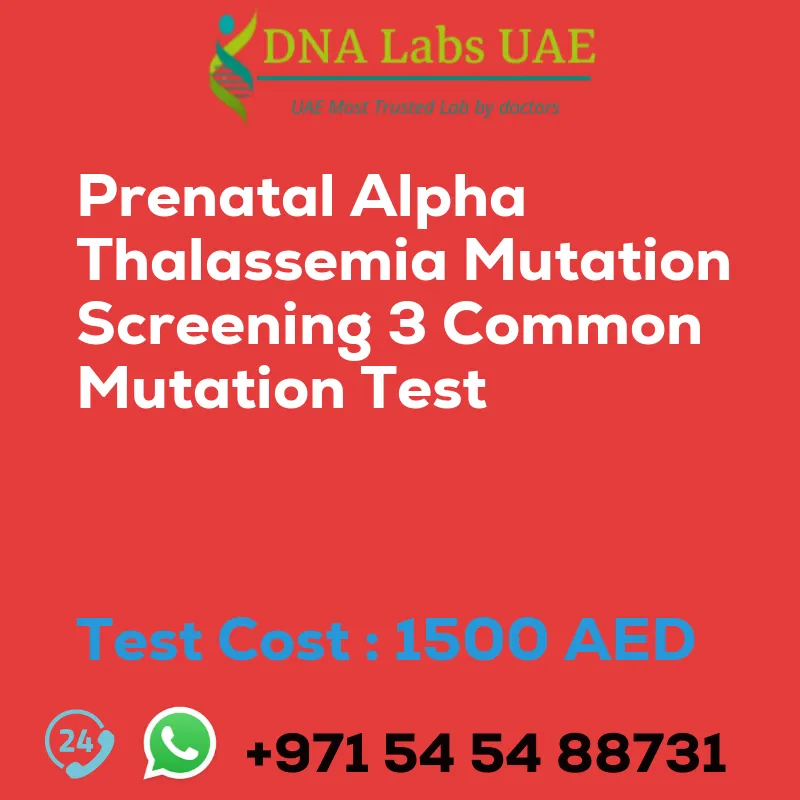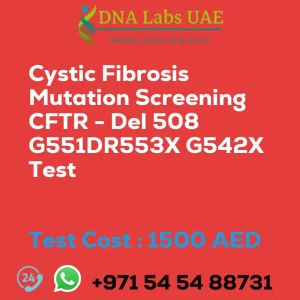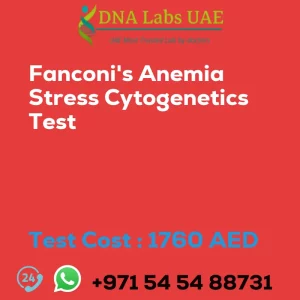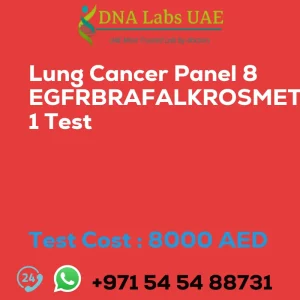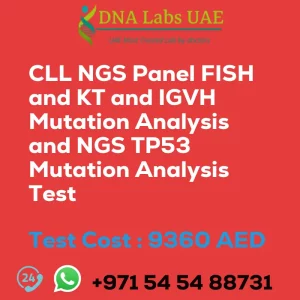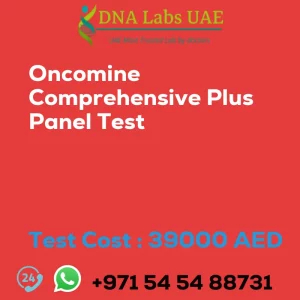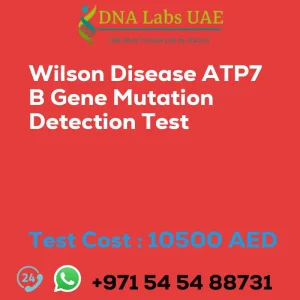Prenatal Alpha Thalassemia Mutation Screening
At DNA Labs UAE, we offer the Prenatal Alpha Thalassemia Mutation Screening test, which helps identify three common mutations associated with this condition. This test is crucial for couples planning to have children, as it provides valuable information about the risk of their child developing severe forms of Alpha Thalassemia.
Test Details
The Prenatal Alpha Thalassemia Mutation Screening test focuses on detecting the following three mutations:
- Deletion of both alpha-globin genes (/–) – This mutation is the most severe form of Alpha Thalassemia, known as Hemoglobin Bart’s hydrops fetalis syndrome. It leads to the complete absence of alpha-globin chains, causing severe anemia and often fatal complications.
- Deletion of three alpha-globin genes (–/) – This mutation is called Hemoglobin H disease and is a milder form of Alpha Thalassemia. It results in reduced production of alpha-globin chains, leading to moderate to severe anemia and potential complications.
- Deletion of two alpha-globin genes (–/) – This mutation is known as a silent carrier or alpha thalassemia trait. It usually doesn’t cause any symptoms or health problems, but carriers of this mutation have an increased risk of having a child with more severe forms of Alpha Thalassemia if their partner is also a carrier.
The Prenatal Alpha Thalassemia Mutation Screening test can be conducted using a peripheral blood, amniotic fluid, chorionic villi, or cord blood sample. The sample is collected in a sterile container, sterile normal saline container, or an EDTA vacutainer (2ml).
Test Procedure and Report Delivery
The Prenatal Alpha Thalassemia Mutation Screening test is performed using the End Point PCR method in our Genetics department. The sample is analyzed, and the results are typically delivered within 10-12 days.
Test Cost and Doctor’s Prescription
The cost of the Prenatal Alpha Thalassemia Mutation Screening test is AED 1500.0. This test requires a doctor’s prescription, except for surgery and pregnancy cases or individuals planning to travel abroad.
Our test is conducted under the supervision of a general physician who specializes in genetic testing. You can trust our experienced team to provide accurate results and comprehensive guidance.
Importance of Prenatal Screening
Prenatal screening for Alpha Thalassemia mutations is crucial for identifying fetuses at risk of developing severe forms of the condition. This information plays a vital role in counseling and managing affected families. It helps determine the need for possible prenatal interventions or early treatments after birth.
By offering the Prenatal Alpha Thalassemia Mutation Screening test, DNA Labs UAE aims to contribute to the well-being of families and ensure a healthy future for their children.
| Test Name | Prenatal Alpha Thalassemia mutation screening 3 common mutation Test |
|---|---|
| Components | Sterile container/ Sterile Normal Saline Container/ EDTA Vacutainer (2ml) |
| Price | 1500.0 AED |
| Sample Condition | Peripheral blood\/Amniotic Fluid\/ Chorionic villi\/ Cord blood |
| Report Delivery | 10-12 days |
| Method | End Point PCR |
| Test type | Genetics |
| Doctor | General Physician |
| Test Department: | |
| Pre Test Information | Prenatal Alpha Thalassemia mutation screening (3 common mutation) can be done with a Doctors prescription. Prescription is not applicable for surgery and pregnancy cases or people planing to travel abroad. |
| Test Details |
Prenatal Alpha Thalassemia mutation screening typically involves testing for the three most common mutations associated with the condition. These mutations are: 1. Deletion of both alpha-globin genes (/–) – This mutation is the most severe form of Alpha Thalassemia and is known as Hemoglobin Bart’s hydrops fetalis syndrome. It results in the complete absence of alpha-globin chains, leading to severe anemia and often fatal complications. 2. Deletion of three alpha-globin genes (–/) – This mutation is known as Hemoglobin H disease and is a milder form of Alpha Thalassemia. It results in a reduced production of alpha-globin chains, leading to moderate to severe anemia and potential complications. 3. Deletion of two alpha-globin genes (–/) – This mutation is known as silent carrier or alpha thalassemia trait. It typically does not cause any symptoms or health problems, but carriers of this mutation have an increased risk of having a child with more severe forms of Alpha Thalassemia if their partner is also a carrier. Prenatal screening for these mutations is important for identifying fetuses at risk of developing severe forms of Alpha Thalassemia. This information can help guide counseling and management options for affected families, including possible prenatal interventions or early treatments after birth. |

